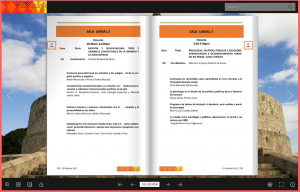
Dr. Belén Mesurado presented a paper with the title “Conducta prosocial hacia los extraños y los amigos: el rol de la empatía positiva y negativa” [Prosocial behavior toward strangers and friends: the role of the positive and negative empathy], co-authored with María Cristina Richaud (CONICET), at the 36th Congreso Interamericano de Psicología, organised by the Sociedad Interamericana de Psicología, and that took place in the city of Merida, Yucatan (Mexico).
Here you may find the abstract of her presentation:
Prosocial behavior is behavior aimed at helping a person or group of persons. Different studies showed that prosocial behavior can vary in relation to the person receiving such help, for example, people are more likely to help those with whom they have an affective relation. On the other hand, empathy was shown to be a strong promoter of prosocial behavior regardless of the person receiving the aid. Different studies have shown that empathy is a powerful motivator of prosocial behavior. However few studies have distinguished between negative and positive empathy. Negative empathy means the ability to empathize with the other when they are suffering a need or going through a difficult situation, while positive empathy is the ability to empathize with the other in a situation of success. Also, recent studies show that positive and negative empathy can play a differentiating role in the prediction of prosocial behavior.
The aim of this study is to analyze the role of both types of empathy (positive and negative) on prosocial behavior directed towards a stranger or a friend. The sample included 300 adolescents between 11 and 19 years old (M = 13.74, SD = 1.44) of both sexes. To evaluate the positive and negative empathic response, two stories were elaborated describing situations of suffering (negative empathy) and situations of success (positive empathy) carried out by a stranger or a friend. Participants were then asked how they would react to this hypothetical situation by completing Padilla-Walker et al. (2011)’s prosociality questionnaire towards strangers and friends, respectively. The stories of positive empathy and negative empathy were distributed to the participants in a random way. MANOVA was performed to evaluate the objective of the study, using as DV the levels of prosociality towards strangers and friends, and as IV positive and negative empathy’ and the sex of the participants. The results indicate that there are important differences in prosocial behavior depending on the empathy and the person who receives the aid.

